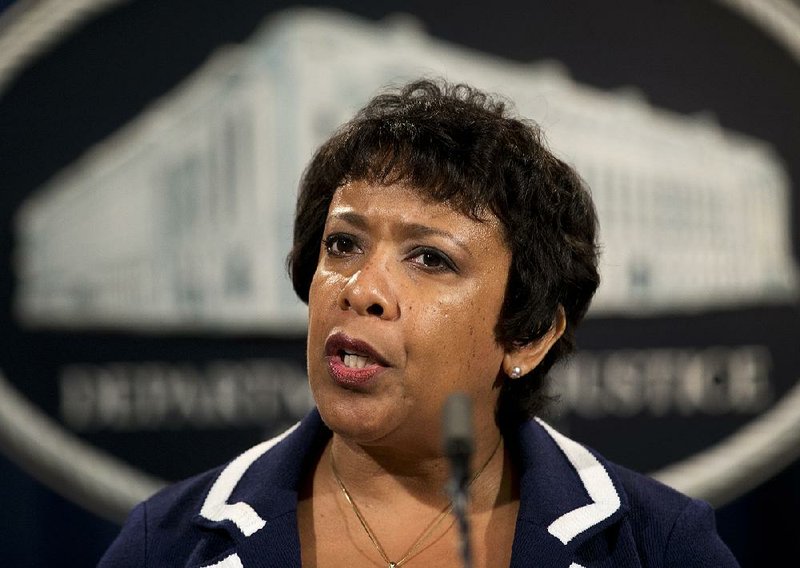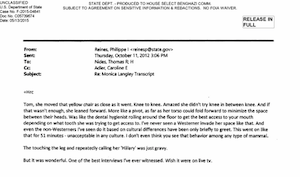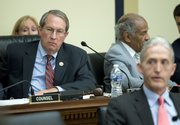WASHINGTON -- Attorney General Loretta Lynch, testifying before a House panel Tuesday, rejected Republican demands to discuss her decision against prosecuting Hillary Clinton for her use of a private email server when she was secretary of state.
RELATED ARTICLES
http://www.arkansas…">Sanders endorses Clinton's bid http://www.arkansas…">'Dump Trump' backers focused on rules meeting
Republicans demanded to know how Clinton could have avoided prosecution under a "gross negligence" law when FBI Director James Comey had described her and her aides as "extremely careless" in their handling of classified information.
Lynch said she stood by the "unanimous recommendation" of Comey, "career independent investigators" and lawyers that charges shouldn't be brought against Clinton or her aides for her use of a private email server when she was secretary of state.
"I accepted that recommendation. I saw no reason not to accept it," she testified. "The matter was handled like any other matter."
The panel's chairman said the former secretary of state's careless handling of official communications may have jeopardized U.S. national security.
"She cannot be trusted with the nation's most sensitive secrets" if elected president, Rep. Bob Goodlatte of Virginia, chairman of the House Judiciary Committee, said of the Democratic presidential candidate at the opening of Tuesday's hearing. He said the Justice Department's decision not to prosecute Clinton "defies logic and the law."
Goodlatte told Lynch it was "an abdication of your responsibility" to refuse to answer the committee's questions.
The attorney general said repeatedly that "it would be inappropriate for me to comment further," and she stuck to that position despite repeated challenges from Republicans during the 4½-hour hearing.
Toward the end of the session, Rep. Dave Trott of Michigan said he'd counted 74 examples of Lynch saying she wouldn't or couldn't comment.
Rep. Louie Gohmert of Texas said Lynch hasn't given any indication that she'd reviewed the facts underlying the FBI's investigation or the bureau's interview with Clinton.
"I find it extraordinary that, after a 3½-hour interview, so quickly a recommendation was made," Gohmert said. "Your oath was not to follow the recommendation of some team. Your oath is your own responsibility to our Constitution and those working under you."
Lynch said she decided "to accept the recommendation of the team of agents and investigators who worked on this" and that "all of the relevant facts were considered and investigated thoroughly."
Rep. Trey Gowdy of South Carolina questioned the assumption that a prosecutor would have needed to show that Clinton had a "specific intent" to break the law when that's not required in criminal prosecutions on charges such as reckless homicide.
Republicans also pressed Lynch on her meeting aboard her plane with former President Bill Clinton in the days before the email investigation ended, a decision Lynch has acknowledged "cast a shadow" over her role.
She told the committee Tuesday that it was a "social conversation."
"Nothing of any relationship to the email investigation was discussed," Lynch said of the meeting on the airport tarmac in Phoenix.
Several Republicans echoed the suggestion by Donald Trump, the presumptive Republican presidential nominee, that Lynch cut a deal to let Clinton off the hook in return for keeping her job if the Democrat becomes president. Lynch denied any such motivation and said she hasn't discussed her future with the Clintons or their advisers.
The dispute over Hillary Clinton's emails also persists in a civil suit by a conservative group. Clinton's longtime lawyer, David Kendall, told a U.S. judge Tuesday that the group, Judicial Watch, doesn't need to question her because of the surfeit of information already publicly available, including Comey's comments and a report in May by the State Department's inspector general.
The record "already answers those questions or makes clear that Secretary Clinton has no personal knowledge to provide," Kendall said in court papers. U.S. District Judge Emmet Sullivan has scheduled a hearing for Monday on the question.
In its Freedom of Information Act lawsuit, Judicial Watch wants to take a deposition from Clinton as it pursues information about top aide Huma Abedin's overlapping employment by the State Department, the Clinton Foundation and an outside consulting firm.
On Monday, Goodlatte and a fellow House Republican, Oversight Committee Chairman Jason Chaffetz of Utah, asked federal prosecutors to open an investigation into whether Clinton committed perjury before Congress.
"The evidence collected by the FBI during its investigation of Secretary Clinton's use of a personal email system appears to directly contradict several aspects of her sworn testimony," states the letter, which is addressed to Channing Phillips, the U.S. attorney for the District of Columbia.
The lawmakers' letter doesn't specify any perjury, instead referring to Comey's testimony last week before the Oversight Committee that the truthfulness of Clinton's remarks to Congress wasn't within the scope of the FBI's previous investigation.
Clinton has said she never sent or received emails "marked classified."
Comey, when questioned at a hearing of Chaffetz's committee last week, said the assertion was "not true" before adding there was no evidence that Clinton or her aides intended to violate laws governing classified actions, and therefore "no reasonable prosecutor" would bring a case.
Information for this article was contributed by Chris Strohm, Ben Brody, Billy House and Andrew Harris of Bloomberg News and by Eric Tucker and Erica Werner of The Associated Press.
A Section on 07/13/2016


